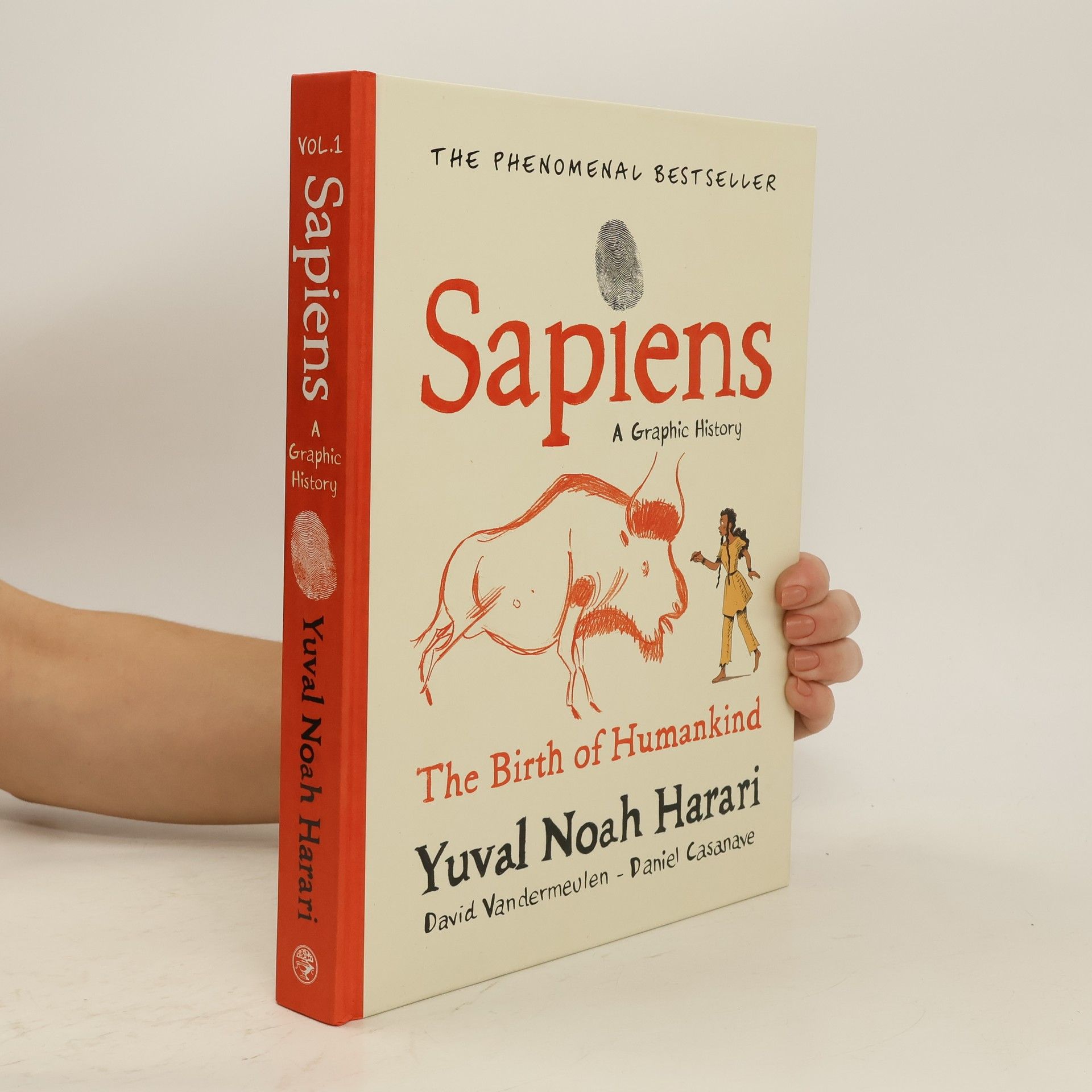"¿Cómo logró nuestra especie imponerse en la lucha por la existencia? ¿Por qué nuestros ancestros recolectores se unieron para crear ciudades y reinos? ¿Cómo llegamos a creer en dioses, en naciones o en los derechos humanos; a confiar en el dinero, en los libros o en las leyes? ¿Cómo acabamos sometidos a la burocracia, a los horarios y al consumismo? ¿Y cómo será el mundo en los milenios venideros? En De animales a dioses, Yuval Noah Harari traza una breve historia de la humanidad, desde los primeros humanos que caminaron sobre la Tierra hasta los radicales y a veces devastadores avances de las tres grandes revoluciones que nuestra especie ha protagonizado: la cognitiva, la agrícola y la científica. A partir de hallazgos de disciplinas tan diversas como la biología, la antropología, la paleontología o la economía, Harari explora cómo las grandes corrientes de la historia han modelado nuestra sociedad, los animales y las plantas que nos rodean e incluso nuestras personalidades. ¿Hemos ganado en felicidad a medida que ha avanzado la historia? ¿Seremos capaces de liberar alguna vez nuestra conducta de la herencia del pasado? ¿Podemos hacer algo para influir en los siglos futuros? Audaz, ambicioso y provocador, este libro cuestiona todo lo que creíamos saber sobre el ser humano: nuestros orígenes, nuestras ideas, nuestras acciones, nuestro poder- y nuestro futuro." --Contratapa.
Yuval Noah Harari Libros
Este autor aborda cuestiones macrohistóricas, explorando la relación entre la historia y la biología. Profundiza en la naturaleza única del Homo sapiens y se pregunta si las personas han sido más felices a medida que se ha desarrollado la historia. Su trabajo a menudo desafía nuestra comprensión del progreso, examinando si la historia posee una dirección o justicia inherente. Los lectores a aprecian su habilidad para conectar un vasto conocimiento histórico con profundas reflexiones sobre la condición humana.







El historiador y filósofo más influyente de la actualidad nos narró de forma extraordinaria la compleja trama de la historia de la humanidad en su libro Sapiens. De animales a dioses. Con la ayuda de David Vandermeulen y las maravillosas ilustraciones de Daniel Casanave, este otoño publicamos Sapiens. El nacimiento de la humanidad, la adaptación gráfica de un best seller internacional que lleva quince millones de ejemplares vendidos en todo el mundo. Una historia en imágenes que pretende acercarse a las nuevas generaciones y contribuir a explorar las formas en que la biología y la historia nos han definido y han mejorado nuestra comprensión de lo que significa ser "humano"
Homo Deus
- 496 páginas
- 18 horas de lectura
Yuval Noah Harari, autor bestseller de Sapiens. De animales a dioses, augura un mundo no tan lejano en el cual nos veremos enfrentados a una nueva serie de retos. Homo Deus explora los proyectos, los sueños y las pesadillas que irán moldeando el siglo XXI -desde superar la muerte hasta la creación de la inteligencia artificial.-- Amazon.com
21 lecciones para el siglo XXI
- 408 páginas
- 15 horas de lectura
"¿Cómo podemos protegernos de las guerras nucleares, los cataclismos ecológicos o las tecnologías disruptivas? ¿Qué podemos hacer contra la propagación de la posverdad o la amenaza del terrorismo? ¿Qué debemos enseñar a nuestros hijos? Con la misma prosa inteligente, fresca y provocadora, Harari vuelve a librerías con un nuevo título, 21 lecciones para el siglo XXI, en el que examina algunas de las cuestiones más urgentes de nuestro presente. El hilo dorado que recorre este estimulante nuevo libro es el desafío de mantener nuestro enfoque colectivo e individual frente al constante y desorientador cambio que estamos viviendo. ¿Somos aún capaces de entender el mundo que hemos creado?"--Cubierta trasera
Homo Deus. Breve historia del mañana
- 496 páginas
- 18 horas de lectura
Tras el éxito de Sapiens, Yuval Noah Harari explora el futuro de la humanidad y nuestra obsesión por convertirnos en dioses. Con más de un millón de ejemplares vendidos, este bestseller del New York Times aborda cómo, en el último siglo, hemos logrado frenar la hambruna, la peste y la guerra. Por primera vez, más personas mueren por obesidad que por hambre, y hay más probabilidades de suicidio que de morir en conflictos bélicos. Harari plantea preguntas inquietantes sobre el futuro: ¿Qué ocurrirá con la democracia cuando Google y Facebook conozcan nuestras preferencias políticas mejor que nosotros mismos? ¿Cómo afectará la inteligencia artificial al estado de bienestar, creando una "clase innecesaria"? Además, se cuestiona cómo enfrentaremos los avances en ingeniería genética y si Silicon Valley podría establecer nuevas religiones en lugar de solo producir dispositivos inteligentes. Este análisis abarca los sueños y pesadillas que definirán el siglo XXI, desde la superación de la muerte hasta la creación de inteligencia y vida artificial. ¿Hacia dónde nos dirigimos y cómo protegeremos al mundo de nuestros propios poderes destructivos? Aquí se presenta una reflexión profunda sobre el futuro de la evolución.
The book includes two exclusive essays by Yuval Noah Harari that delve into pressing contemporary issues. "The Crisis of Liberalism" explores the challenges facing liberal democracies today, while "The Theater of Terror" examines the impact of fear and spectacle in modern society. Harari's insights provide a thought-provoking analysis of political and social dynamics, encouraging readers to reflect on the future of governance and the influence of terror in shaping public perception and policy.
Unstoppable Us
How humans took over the world. vOLUME 1
*From the author of the multi-million bestselling Sapiens comes an incredible new story of the human race, for younger readers.* We humans aren't strong like lions, we don't swim as well as dolphins, and we definitely don't have wings! So how did we end up ruling the world? The answer to that is one of the strangest tales you'll ever hear. And it's a true story . . . Have you ever wondered how we got here? From hunting mammoths, to flying to the moon? It is because we are unstoppable. But what made us so? Well, we have the most amazing superpower: the ability to tell stories. Fairy tales have led us from imagining ghosts and spirits to being able to create money (yes, really!). And this has made us very powerful . . . but very deadly. Nothing stands in our way, and we always want more. So get ready for the most amazing story there ever was - the incredible true tale of the Unstoppables. Find out how fire shrank our stomachs, how our ancestors spoke to animals, what football can tell us about being human, how we used our superpower for good and bad . . . and how YOU have the superpower to change the world. With full-colour illustrations showing the relentless rise and rise of the human race, this is history like you've never experienced it before.
In the second "Sapiens" volume, Yuval Noah Harari tells the story of how we took over the world; how an unlikely marriage between a god and a bureaucrat created the first empires; and how war, famine, disease, and inequality became a part of the human condition. The origins of modern farming are introduced through Elizabethan tragedy, the changing fortunes of domesticated plants and animals are tracked in the columns of the Daily Business News, and the story of urbanization is told as a travel brochure offering discount journeys to ancient Babylon and China.
Yuval Noah Harari Box Set
Sapiens; Homo Deus; 21 Lessons for the 21th Century
Sapiens: A Graphic History: The Birth of Humankind (Vol. 1)
- 256 páginas
- 9 horas de lectura
The first volume, in a hardcover edition for libraries, of the graphic adaptation of Yuval Noah Harari's smash #1 New York Times and international bestseller recommended by President Barack Obama and Bill Gates, with gorgeous full-color illustrations and concise, easy to comprehend text for readers of all ages. One hundred thousand years ago, at least six different species of humans inhabited Earth. Yet today there is only one--homo sapiens. What happened to the others? And what may happen to us? In this first volume of the full-color illustrated adaptation of his groundbreaking book, renowned historian Yuval Harari tells the story of humankind's creation and evolution, exploring the ways in which biology and history have defined us and enhanced our understanding of what it means to be "human." From examining the role evolving humans have played in the global ecosystem to charting the rise of empires, Sapiens challenges us to reconsider accepted beliefs, connect past developments with contemporary concerns, and view specific events within the context of larger ideas. Featuring 256 pages of full-color illustrations and easy-to-understand text covering the first part of the full-length original edition, this adaptation of the mind-expanding book furthers the ongoing conversation as it introduces Harari's ideas to a wide new readership. --Wall Street Journal


